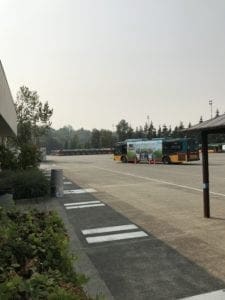Unmute the Commute: The Bus Roadeo
When you think rodeos, bucking broncos or steer wrestling may come to mind, but what about parallel parking and judgement stops? Tammy Klein is a King County Metro bus operator and right now, she is navigating a bus through a series of cones in paved lot behind Metro’s training center in Tukwila. She’s training for a bus roadeo.
Klein seems in her element behind the big steering wheel of this bus. In fact, she waits all year for this moment.
“I am very competitive, and I love to play games, so I always want to win,” she says.
Klein is training for the state bus roadeo. It’s sort of like the Olympics of public transit, with different agencies from around the state sending bus operators and mechanics to compete against one another in timed events. The winners will go on to the International Bus Roadeo, which, next year, is in Louisville, Kentucky.
Tammy Klein will represent King County Metro at the state competition – she received this honor after winning the roadeo for the transit agency, something she has done seven time before.
Seen from a distance, a bus roadeo run doesn’t look very impressive – it’s just a bus moving around some cones in an empty parking lot. But inside the bus, you can see the difficulty it takes to maneuver a big piece of machinery forward and backwards through impossibly tight spaces. Then, there is the final obstacle — the judgement stop, Where Klein accelerates towards and then attempts to stop within six inches of a single cone.
The roadeo is meant as a training exercise for bus operators. It helps them practice maneuvering and just getting used to driving a bus. It is also a chance to acknowledge some of the state’s best drivers and mechanics.
“I think that the bus roadeo is a great way to build the element of a competition with a training element and skill,” says Justin Leighton, executive director of the Washington State Transit Association – a trade group that puts the event on. “Really honing in [on] that skillset of being a driver, working in a maintenance facility.”
The state bus roadeo started over 30 years ago. Originally, it was just for bus drivers but the mechanics competition was added in the 1990s. In that event, a team of three mechanics try to fix different parts of a bus that judges have put bugs in. Fixing a bus is something normally done in a transit agency’s shop, the roadeo is a chance to showcase skills to other.
Klein says its gotten her used to driving a bus.
“It helps you with the safety issues of this big machine that is around fragile people,” she says. “To me, it makes the bus I’m driving — [it] makes me feel like it’s my second skin.”
It can also be motivation. It’s one of her favorite parts of the job. Originally, she wanted to be a truck driver but couldn’t with her schedule. Through a chance encounter, she became a bus operator for King County, and, during her initial training looked out at this roadeo course “and right from the get go, it was like, wow, I want to do that,” she says.
But, it wasn’t that easy – it took Klein 10 years to win her first King County Metro roadeo.
“And I would practice, every year, get better and better and finally just happened to be there – did a good score where other competitors just made a little bit more errors than I did,” she says. “The roadeo is once a year. You don’t make it – it’s 364 more days.”
And so, she keeps practicing and she does it on her own time. She’ll take days off work and spend them running the course over and over again – sometimes for 48 hours a week. The bus operator roadeo also consists of a precheck – basically, the driver checks the bus for mechanical problems or safety issues– and a uniform inspection. For this, Klein has an extra uniform that she leaves in her closet all year so it stays clean.
But, in the six years of going to state, winning has proven elusive.
She’s hoping her persistence pays off, but, until then, she’ll just enjoy driving.
“I like driving, and the bus, it’s like a challenge,” she says. “I like challenges. I like driving a car, I like driving a bus, I commute on my motorcycle every day – I just like driving. And I get paid for it. I’m like really?”
Produced by Hans Anderson
Unmute the Commute is supported in part by Just One Trip – a King County Metro campaign to get you out of your car starting with just one trip.
Unmute the Commute: Transit Fare Enforcement
Have you ever wondered how transit fare enforcement is actually enforced? Today on Unmute the Commute, KBCS’s Yuko Kodama takes us behind-the-scenes of how the system works.
Unmute the Commute is a weekly series featuring stories that move you.


